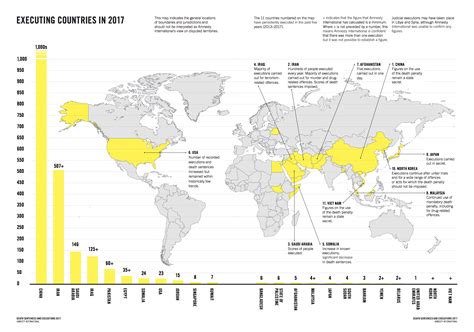Global executions have surged to their highest level in a decade, as revealed by a recent report from Amnesty International. In 2024, over 1,500 recorded executions took place across the globe. The report highlighted countries like Iran, Iraq, and Saudi Arabia as leading contributors to this grim statistic.
Amnesty International’s Findings
According to Agnes Callamard, Secretary General of Amnesty International, there is a shifting tide in global attitudes towards capital punishment. She expressed optimism that the world is moving towards abolishing the death penalty entirely. Despite the recent spike in executions compared to 2015 figures – where over 1,600 individuals faced capital punishment – progress is being made.
Underreported Figures
It’s essential to note that the actual number of executions worldwide may be significantly higher than reported. China alone is believed to carry out thousands of undisclosed executions annually. Additionally, nations like North Korea and Vietnam do not release official data on their use of the death penalty due to state secrecy laws.
The lack of transparency in these regions raises concerns about potential human rights violations and injustices that may go unaddressed without accurate reporting mechanisms in place.
Rising Execution Rates
Iran, Iraq, and Saudi Arabia emerged as key drivers behind the uptick in known executions globally. Iraq saw a nearly fourfold increase in its execution rate from at least 16 to 63 cases. Similarly, Saudi Arabia doubled its annual total from 172 to at least 345 recorded executions.
Meanwhile, Iran reported an increase from at least 853 executions in 2023 to over 970 in 2024. The surge was largely attributed to these countries using capital punishment against protesters and for offenses related to drug crimes.
Challenges and Progress
The report shed light on challenges hindering accurate data collection on global execution rates. Restrictive governmental practices in nations like China and Vietnam impede organizations like Amnesty International from accessing comprehensive statistics on this issue.
However, amid concerning trends, there have been positive developments indicating a shift towards abolitionist policies. For instance:
– Zimbabwe repealed the death penalty for ordinary crimes.
– Recent cases saw death row inmates receiving clemency or acquittals.
– A significant majority of UN member states supported a moratorium on capital punishment last year.
These steps signify growing international consensus on moving away from punitive measures such as the death penalty towards more humane forms of justice and rehabilitation.
As we reflect on these sobering findings, it becomes evident that while progress has been made towards curbing global execution rates, concerted efforts are still needed to ensure respect for human rights and dignity across all nations.



Leave feedback about this